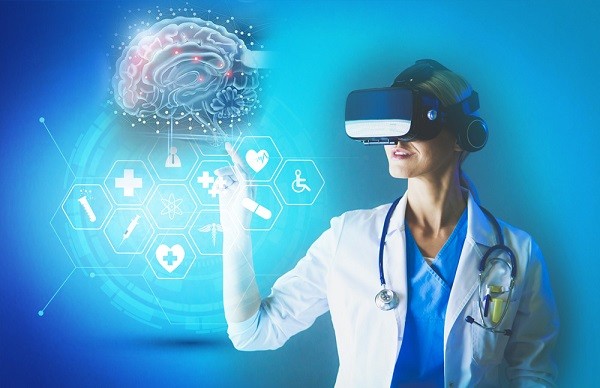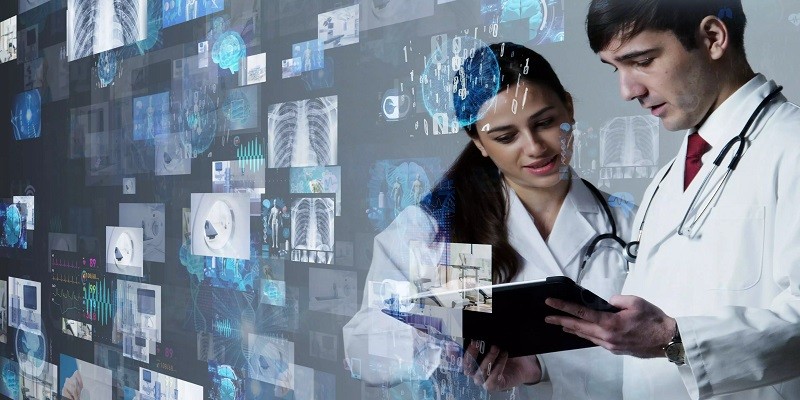AI in Healthcare: Transforming Patient Care And Medical Research
AI in healthcare is transforming patient care and medical research, significantly improving healthcare outcomes and accelerating scientific discoveries. With the power of artificial intelligence, healthcare professionals can analyze vast amounts of patient data, predict diseases, personalize treatment plans, automate administrative tasks, and enhance clinical decision-making.
Moreover, AI algorithms help researchers uncover patterns in patient records, genomics, and medical imaging to develop innovative treatments and therapies. By harnessing the potential of AI, healthcare systems can deliver more efficient, accurate, and accessible care to patients while also advancing medical knowledge and revolutionizing the healthcare industry.
As the technology continues to evolve, AI is poised to revolutionize healthcare by augmenting human capabilities and driving advancements in precision medicine, preventive care, and overall patient well-being.
Read More – The Rise of Quantum Computing: Breaking Down the Complexities
The Role Of AI In Healthcare
AI in healthcare is revolutionizing patient care and medical research, offering advancements in diagnostics and treatment plans. It plays a pivotal role in transforming the industry by improving accuracy and efficiency.
Improving Diagnostics
- AI accelerates the diagnostic process
- Uses machine learning for precise results
- Reduces errors in diagnosing illnesses
Personalized Treatment Plans
- AI tailors treatments based on individual data
- Enhances patient outcomes with custom plans
- Adapts to changing patient needs dynamically
Benefits Of AI in Patient Care

Discover the profound impact of AI on patient care, revolutionizing healthcare and medical research. Through advanced technology, AI optimizes treatment plans, diagnoses diseases, and enhances patient outcomes. By leveraging data analytics and machine learning, it offers personalized care and accelerates medical discoveries, ultimately transforming the landscape of healthcare.
Enhanced Accuracy
AI has revolutionized patient care by introducing a level of precision and accuracy that was previously unimaginable. Machine learning algorithms can analyze vast amounts of data, identify patterns, and make predictions with exceptional accuracy. This enables healthcare professionals to make more informed decisions in real time.
With AI, diagnosis and treatment can be expedited, reducing the risk of errors and improving patient outcomes. By analyzing medical records, lab results, and imaging studies, AI algorithms have proved to be highly accurate in identifying diseases and suggesting suitable treatment plans.
Not only that, AI can spot trends and predict disease outbreaks, allowing healthcare facilities to be proactive in preventing diseases from spreading. This enhanced accuracy is particularly crucial in life-threatening conditions where early detection and timely intervention can make a significant difference.
In addition to assisting in diagnosis and treatment, AI can also play a vital role in predicting patient deterioration. By continuously monitoring vital signs and analyzing data in real-time, AI algorithms can provide early warning signs, enabling healthcare providers to intervene promptly and prevent adverse events.
Read More – Navigating the Future: The Evolution of Autonomous Vehicles
Efficient Resource Management
AI has also proven to be invaluable in the efficient management of healthcare resources, maximizing their utilization and streamlining operations. Intelligent algorithms can analyze data sets to identify areas where resources are being underutilized or misallocated.
This data-driven approach ensures that critical resources, such as hospital beds and healthcare staff, are optimally allocated and utilized. For example, AI algorithms can predict patient flow and bed occupancy, enabling hospitals to efficiently manage bed availability and reduce waiting times.
Furthermore, AI can automate administrative tasks, freeing up valuable time for healthcare professionals to focus on patient care. Automating tasks such as scheduling appointments, updating medical records, and preparing reports reduces the administrative burden and increases overall efficiency.
In addition to resource allocation, AI can also assist in supply chain management. By analyzing data on medication usage and inventory levels, AI algorithms can predict demand, optimize inventory, and ensure timely restocking, reducing the risk of medication stockouts.
AI’s Impact On Medical Research
When it comes to medical research, AI has emerged as a game-changer, revolutionizing the way scientists approach drug discovery and precision medicine. The impact of AI in medical research has been remarkable, opening up new possibilities and transforming patient care. In this blog post, we will explore the fascinating ways AI is shaping the landscape of medical research. Let’s delve into the specific areas where AI is making significant strides.
Accelerated Drug Discovery
AI is accelerating the drug discovery process, enabling researchers to identify and test potential candidate molecules more efficiently. By analyzing vast amounts of scientific literature and past research data, AI algorithms can identify patterns and make predictions about the efficacy and safety of different compounds. This allows researchers to focus their efforts on the most promising drug candidates, reducing the time and cost involved in traditional trial-and-error approaches.
AI algorithms can also simulate the effects of drugs on the human body, predicting potential side effects and drug interactions. This not only speeds up the discovery process but also helps researchers design safer and more effective drugs. Ultimately, AI-enabled drug discovery has the potential to bring life-saving treatments to patients faster and more efficiently.
Read More – The Power of Visual Storytelling in PowerPoint Presentations
Precision Medicine Advancements
Precision medicine, which tailors treatment strategies to an individual’s unique characteristics, is another area where AI is making significant advancements in medical research. Through the analysis of large-scale genomic and clinical data, AI algorithms can identify patterns and correlations that enable tailored treatment plans.
AI algorithms can analyze a patient’s genetic information to determine their susceptibility to certain diseases and predict their response to specific treatments. This enables doctors to offer personalized treatment options that are more effective and have fewer adverse effects. From cancer treatment to chronic disease management, AI is revolutionizing the field of precision medicine, providing patients with targeted therapies based on their individual needs.
Building A Better Future
AI’s impact on medical research is undeniable. From accelerating drug discovery to advancing precision medicine, AI is transforming patient care and revolutionizing the way medical research is conducted. By harnessing the power of AI, healthcare professionals can develop more effective treatments, improve patient outcomes, and ultimately build a healthier future.
With continued advancements in technology and further integration of AI into the healthcare field, the potential for innovation and transformation in medical research is immense. As AI continues to evolve, it will play an increasingly critical role in our collective pursuit of better healthcare outcomes.
Challenges And Future Of AI in Healthcare
The integration of AI in healthcare presents opportunities for revolutionizing patient care and medical research. As we delve into the implications of this technology, it is essential to acknowledge the challenges that come with its implementation and envision the promising future it holds.
Data Privacy Concerns
Data privacy is a critical concern in healthcare AI. Safeguarding patient information is paramount to maintaining trust in these technologies.
Integration With Clinical Workflow
Seamless integration with existing clinical workflows is vital for the success of AI in healthcare. Ensuring compatibility and efficiency is key.
Frequently Asked Questions
What Are The Key Benefits Of AI in Healthcare?
AI in healthcare improves diagnosis accuracy, enhances patient care, and fosters medical research advancements.
How Does Ai Contribute To Transforming Patient Care?
AI helps in personalizing treatment plans, predicting patient outcomes, and streamlining administrative tasks.
What Are The Major Areas Where AI is Applied In Medical Research?
AI is used in drug discovery, genomic analysis, disease detection, and precision medicine development.
Can AI technology Improve Healthcare Accessibility?
Yes, AI can extend healthcare access through telemedicine, remote monitoring, and healthcare chatbots.
What Are The Potential Challenges Of Implementing AI in Healthcare?
Ethical concerns, data privacy issues, and ensuring AI accuracy are challenges in AI implementation in healthcare.
Conclusion
As AI continues to advance, its impact on healthcare is remarkable. Patient care is increasing. Medical research is evolving. The future of healthcare is brighter with AI by our side. Embracing this technology opens new possibilities for improved outcomes and innovative solutions in the medical field.

